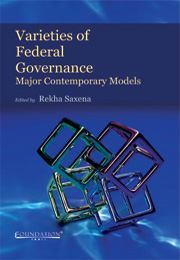Book contents
- Frontmatter
- Contents
- List of Contributors
- Foreword
- Acknowledgements
- Introduction
- I Theoretical and Comparative Dimensions
- II Presidential Federal Systems
- III Commonwealth Parliamentary Federations
- IV Non-Commonwealth Parliamentary Federations in Afro-Asia
- V European Parliamentary Federations
- VI Devolutionary Systems
- 18 The Union's Place: Scottish-English Relations after Devolution
- 19 The Federal Debate in Sri Lanka
- VII Supranational Confederalism/Federalism?
19 - The Federal Debate in Sri Lanka
from VI - Devolutionary Systems
Published online by Cambridge University Press: 05 June 2012
- Frontmatter
- Contents
- List of Contributors
- Foreword
- Acknowledgements
- Introduction
- I Theoretical and Comparative Dimensions
- II Presidential Federal Systems
- III Commonwealth Parliamentary Federations
- IV Non-Commonwealth Parliamentary Federations in Afro-Asia
- V European Parliamentary Federations
- VI Devolutionary Systems
- 18 The Union's Place: Scottish-English Relations after Devolution
- 19 The Federal Debate in Sri Lanka
- VII Supranational Confederalism/Federalism?
Summary
In recent years, Sri Lanka has seriously considered the federal idea as a basis for a political solution to the island's protracted ethnic conflict. There remains, however, steadfast opposition to the federal idea among significant sections of the island's Sinhalese majority and many of these anti-federalists are now part of the Rajapakse Administration that has governed the country since 2005. The chapter seeks to discuss the federal debate in Sri Lanka placing it in historical context, critically examine the reasons why federalism has once again in recent years become so unacceptable in the island's political discourse and reaffirm the arguments in favour of a federal based solution to the island's ethnic conflict.
Federalism in the Political Discourse of the Country
Federalism has been part of Sri Lanka's political discourse for a long time. In the 1920s, the young S.W.R.D. Bandaranaike, who later formed the Sinhala nationalist Sri Lanka Freedom Party and became Ceylon's fourth post independence Prime Minister in 1956, delivered a series of lectures in Jaffna, in which he argued that a federal Ceylon would be appropriate for the island given its ethnic diversity. Interestingly in one of his lectures he suggested that the island be part of a larger federal India. Reports of the lectures indicate that there were many critics and skeptics from among the Tamil members of the audience who expressed doubts as to how a federal Ceylon would address the grievances and aspirations of Tamils leaving outside the northern peninsula.
- Type
- Chapter
- Information
- Varieties of Federal GovernanceMajor Contemporary Models, pp. 447 - 464Publisher: Foundation BooksPrint publication year: 2011

